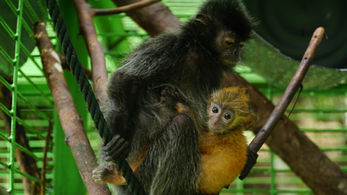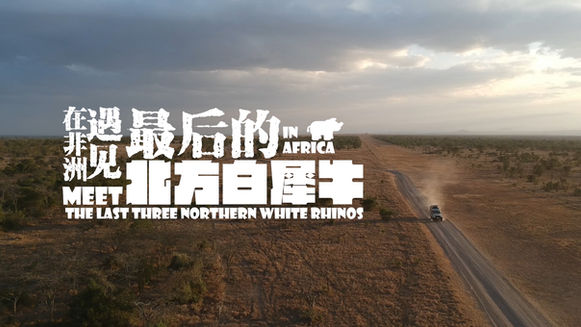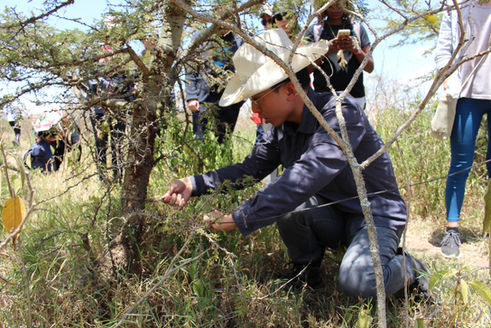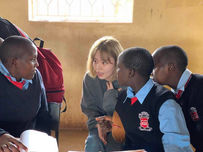
PROGRAM DEVELOPMENT
We develop programs with talents and resources from China to help address global sustainable development challenge.
1.
Agent C
Project
Time: August 2014 - present
Location: Uganda, Kenya, Tanzania, Malawi, Namibia, Mozambique, South Africa, Vietnam, Thailand, Mexico, Bolivia, Suriname
Partners: IUCN, TRAFFIC, WWF, IFAW, Humane Society International, The Eagle Network, Earth League, Wildlife Justice Commission
Intro: For a long time, Chinese people were seen as villains in the global wildlife trade, creating demand for ivory, rhino horn, jaguar teeth, etc. Many NGOs want to understand more about the wildlife trade regarding the Chinese stakeholders, but they find it difficult since the language and culture barriers. Such difficulty creates misunderstandings about the trade, hindering people from fighting it.
Impact: In 2014, we formed a small Chinese investigation team to fight the global illegal wildlife trade, partnering with conservation NGOs worldwide. Utilizing the information we obtain, we also work with partners and design communication projects to engage related stakeholders against illegal wildlife trade. This is the first Chinese investigation team focusing on global illegal wildlife trade investigation.
2.
Indonesian Orangutan Conservation
Time: August 2017 - present
Location: East Kalimantan, Indonesia
Partners: COP (Centre for Orangutan Protection), CAN Borneo (Conversation Action Network Borneo)
Intro: In Indonesia, orangutans and other wildlife have lost their homes and lives due to deforestation caused by oil palm plantations, mining, and logging.
Impact: To conserve orangutans, we are working with CAN Borneo, a local NGO, to establish the first wildlife rescue and rehabilitation center in Indonesia.
The center will provide rescue, medical care, and rewilding training for homeless wildlife and help them return to their habitat. Meanwhile, we are working to protect natural habitats of wildlife and promote sustainable economic development in local communities.
-
BASE CAN, established in 2020 by China House and CAN Borneo is the first wildlife sanctuary in Southeast Asia to be partially supported by a Chinese civil society organization.
-
China House raised more than 15000 USD for the rescue center.
-
We funded a nursery that is now cultivating 85,000 seedlings which are expected to restore 100 hectares of forest habitat for orangutans.
-
We built a Chinese website for CAN, to help CAN engage with Chinese supporters.
-
Through these initiatives, Sun bears, gibbons, pangolins and so on have also been rescued.
3.
Ol Pejeta Wildlife Conservation
Project
Time: June 2018 - present
Location: Conservancies in Eastern and Northern Kenya
Partner: Ol Pejeta Conservancy
Intro: In Africa, wildlife is under severe threats due to poaching, smuggling, illegal trade, human-wildlife conflicts, etc. Ol Pejeta Conservancy has the last two Northern White Rhinos globally and the Sweetwaters Chimpanzee Sanctuary. The Conservancy is one of the only two nature reserves in Africa on the International Union for Conservation of Nature (IUCN) Green List.
Impact: We worked with Ol Pejeta Conservancy to enhance local wildlife protection, including improving and donating Lion Lights, investing in beehives, contributing camera traps, filming documentaries, conducting international business marketing, and raising public awareness.
-
Our students improved solar-powered Lion Lights invented by a local Kenyan. An improved Lion Light costs only one-third of its original price. Upon their return, the students led a fundraising campaign in China, commissioned a Chinese manufacturer for light production, and donated 620 Lion Lights to the Conservancy. The Lion Lights have been outstandingly effective in deterring wildlife from attacking farms, lessening the economic burdens and protecting the local wildlife from retaliation by villagers who would have suffered in the long-term human-wildlife conflict. Our work has been appreciated by the community department of the Ol Pejeta Conservancy.
-
To protect the last two Northern White Rhinos and other wildlife, we initiated student-led fundraising campaigns in China. And they donated six monitoring camera worth 1500 USD, to the Ol Pejeta Conservancy.
-
We produced the first Chinese student-made Northern White Rhino documentary, Meet the Last Three Northern White Rhinos in Africa. These students designed a Chinese brochure for Ol Pejeta Conservancy, impacting thousands of Chinese visitors.
-
We partnered with Ol Pejeta Conservancy to host a live broadcast on Sohu, which gained 230,000 likes, was streamed on Sohu’s homepage, and was reposted by Sohu's CEO.
-
Our students created a wildlife conservation charity brand, Animore+, and conducted a Northern White Rhino-themed offline concert, “Rhino’s Top Secret”, which attracted more than 60 participants. The event indirectly raised the awareness of wildlife conservation among students.
4.
Kenyan Anti - Poaching Patrol Project
Time: July 2014 - present
Location: Various locations in Kenya
Partner: African Network for Animal Welfare (ANAW)
Intro: In Africa, poachers hide snares in the bushes, grass, canopy, or around the tree trunks. When animals roam by, they are likely to be caught by these “traps”. As they try to break free from fright, the snares clutch on tighter, and eventually, many animals die of infected wounds. In Kenya, nearly 100 lions die every year from the traps. Zebras, antelopes, African buffaloes, giraffes, and other animals are also common victims.
These snares are related to the Bushmeat trade, which refers to the trade of hunted wildlife. Poachers mix wildlife meat with livestock meat to make money. According to a report by African Network for Animal Welfare, a local wildlife conservation organization, 40% of meat on the market in Nairobi, comes from Bushmeat.
Impact: Since 2014, We have been working with ANAW to recruit volunteers to work at natural reserves around Nairobi to clear the snares that poachers have placed and to rescue wildlife injured by the snares. Currently 1000+ Chinese and Kenyan Volunteers participate in 50+ Patrols and snare-cutting tours, and have been able to remove 5000+ Snares.
In May 2021, our students organized online fund-raising event and raised around 2500 USD . The money will be used to subsidize anti-poaching workers and purchase patrol tools and medical supplies needed to rescue wildlife.
5.
Anti - FGM
Project
in Kenya
Time: December 2015 - present
Location: Oloitoktok Town, Eastern Kenya
Partner: Maasai Girls Life Time Dream Foundation, Divinity
Intro: About 78% of women aged 15 to 49 have undergone Female Genital Mutilation (FGM) in Maasai tribe in Kenya. Because many of FGM operations are privately administered the sanitation is often unqualified, women are vulnerable to wound infection, massive bleeding, and HIV infection after surgery.
Impact: We partnered with two local NGOs ‒ MAGRIAF and Divinity--to take in girls threatened by FGM and provide them with living expenses, tuition fees, and professional development opportunities.
-
We are the first Chinese civil society organization involved in anti-FGM in Africa. We partnered with MAGRIAF and funded the Maasai Girls Life Time Dream Foundation- a local NGO, which supports girls rescued from FGM.
-
We donated over 15000 USD to the centers, and has been currently supporting for 5 girls.
-
We donated 21 laptops for Divinity to build a computer lab, helping girls and community members with online learning opportunities. In the future, the computer lab will serve as a computer skills training center for the local community.































